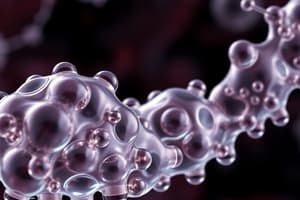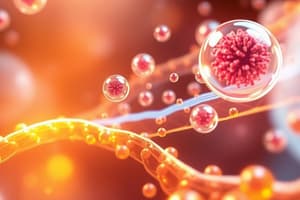Podcast
Questions and Answers
What percentage of the brain is composed of fat?
What percentage of the brain is composed of fat?
- 30%
- 40%
- 60% (correct)
- 50%
Visceral fat protects vital organs such as the heart and kidneys.
Visceral fat protects vital organs such as the heart and kidneys.
True (A)
What are the fat-soluble vitamins mentioned in the content?
What are the fat-soluble vitamins mentioned in the content?
Vitamins A, D, E, and K
Fat-soluble vitamins are best absorbed when combined with foods containing ______.
Fat-soluble vitamins are best absorbed when combined with foods containing ______.
Match the following nutrients with their functions:
Match the following nutrients with their functions:
What happens to nutrient content when lipid elements are removed from food during processing?
What happens to nutrient content when lipid elements are removed from food during processing?
Name one food source of Omega-3 fatty acids.
Name one food source of Omega-3 fatty acids.
What is the primary function of lipids in the body?
What is the primary function of lipids in the body?
Excess adipose tissue can be beneficial for overall health.
Excess adipose tissue can be beneficial for overall health.
Which hormone, secreted by adipose tissue, regulates appetite?
Which hormone, secreted by adipose tissue, regulates appetite?
Fats contain more than ______ the amount of energy than a gram of carbohydrate.
Fats contain more than ______ the amount of energy than a gram of carbohydrate.
Match the essential fatty acids to their key functions:
Match the essential fatty acids to their key functions:
What happens to individuals with insufficient body fat?
What happens to individuals with insufficient body fat?
Glycogen is a more concentrated energy source than fats.
Glycogen is a more concentrated energy source than fats.
What condition may women experience due to inadequate fatty acids?
What condition may women experience due to inadequate fatty acids?
Flashcards are hidden until you start studying
Study Notes
Energy Storage
- Excess energy from consumed food is stored in adipose tissue (fatty tissue).
- Carbohydrates and lipids provide the majority of energy for the human body.
- Glucose is stored as glycogen, which is bulky and contains a lot of water, limiting storage capacity.
- Lipids are more densely packed, storing more energy per gram compared to carbohydrates.
Functions of Lipids
-
Regulation and Signaling:
- Triglycerides maintain body temperature.
- Adipose tissue secretes leptin, regulating appetite.
- Fatty acids are crucial for reproductive health.
- Omega-3 and Omega-6 fatty acids regulate cholesterol, blood clotting, and inflammation.
-
Insulating and Protecting:
- Fat tissue comprises up to 30% of body weight.
- Visceral fat protects vital organs like the heart, kidneys, and liver.
- Subcutaneous fat insulates the body from temperature changes and provides padding for physical activity.
-
Aiding Digestion and Increasing Bioavailability:
- Dietary fats aid the absorption of fat-soluble vitamins (A, D, E, and K).
- Fat-soluble vitamins are mainly found in fatty foods, but some are present in naturally fat-free foods, like leafy greens.
- Fats also increase the bioavailability of phytochemicals, like lycopene and beta-carotene, found in plants.
- Fat removal during food processing leads to the loss of essential nutrients, which are often replaced through enrichment.
Brain Functions
- The brain is 60% fat; lipids are essential for its structure and function.
- Lipids form nerve cell membranes, insulate neurons, and facilitate signal transmission.
Studying That Suits You
Use AI to generate personalized quizzes and flashcards to suit your learning preferences.




